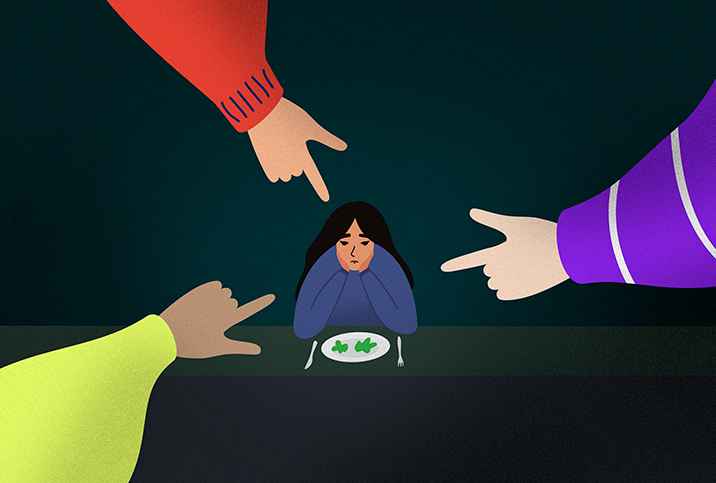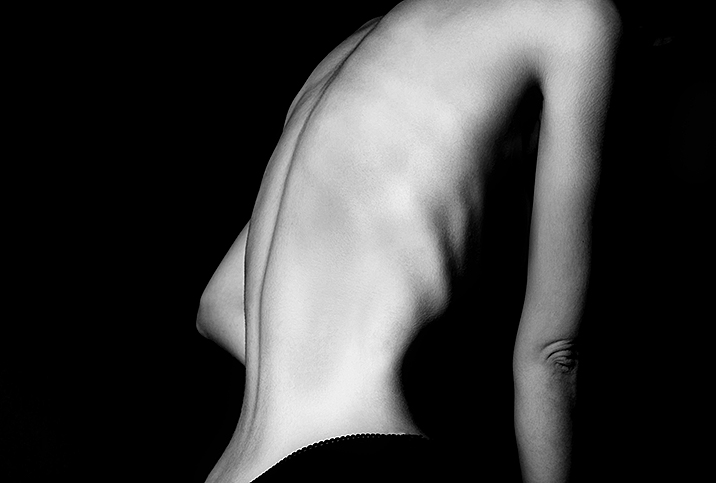Yes, You Can Be Overweight and Struggle With Anorexia

When Tess Holliday, a plus-size model and Instagram influencer, told her audience about her anorexia diagnosis, many of them didn't believe her.
"You are not anorexic! Stop lying to your followers. What's wrong with you, woman? Seriously! This is just wrong," one woman commented.
Even though Holliday is no stranger to criticism—she's often criticized in the media about her weight—these comments still affected her.
"The hate has been overwhelming, but the messages from those of you that felt seen, validated and loved far outweigh the critics," she wrote.
Anorexia that's atypical
Though the vitriol of Holliday's commenters is unwarranted, their confusion may be due to an ignorance of the subject. The terminology for anorexia can be complicated, according to Lillian Rishty, L.C.S.W., a psychotherapist providing mental health services in midtown Manhattan in New York City.
"Someone within the 'normal' weight range wouldn't be diagnosed with anorexia nervosa [AN], because according to the Diagnostic and Statistical Manual of Mental Disorders, one of the criteria for anorexia nervosa is that bodyweight is 'significantly low,'" she explained, referring to the type of anorexia with which most people are familiar.
However, atypical anorexia (AAN), from which Holliday seemingly suffers, was added to the "other specified feeding or eating disorder" section of the manual.
"AAN is when a person meets all of the criteria for anorexia nervosa, 'except that despite significant weight loss, the individual's weight is within or above the normal range,'" Rishty said.
'It's the behaviors and mental state that we need to look at when making a diagnosis.'
Unfortunately, many serious eating disorders go undetected because a patient's loved ones and doctors are so focused on weight and size. When you call to mind a person with anorexia, it's common to think of someone emaciated, bordering on skeletal. However, this is an extremely narrow view of a much wider illness.
"Sometimes, someone with an eating disorder will be at a 'normal' weight, but their history is also relevant because they may have started out 'overweight' and lost a significant amount through their eating disorder," Rishty explained. "We may look at someone who's overweight and losing weight as 'just dieting' and commend them for their weight loss. But it's the behaviors and mental state that we need to look at when making a diagnosis."
It's also important to remember that someone larger in size can be engaging in eating disorder behaviors, such as severe food restriction and purging.
It's not all about weight
Many people think eating disorders are all about food and weight, but it's important to note the psychological factors, too.
"There are often obsessive thoughts, a need for control, feelings of anxiety, depression, shame and high-stress levels," Rishty said. "These psychological symptoms can be present in anyone, regardless of size. There are also irrational fears of weight gain or disturbed perception of their body shape or size."
In addition to the myth that you have to be thin to suffer from an eating disorder, some people also believe only women are affected, anorexia is the only type of eating disorder, and eating disorders are a choice people make and they're linked to vanity and a desire to be thin.
"Any person of any size, shape or weight can have disordered eating and body image issues, whether that means restricting food, bingeing and purging, having an intense fear of gaining weight, or something else," said Sarah Kaufman, L.M.S.W., a psychotherapist at Cobb Psychotherapy, with New York offices in midtown Manhattan and Brooklyn Heights. "Body weight is not an indicator of what is happening inside."
Beliefs vs. facts
Kaufman has suggestions for people who struggle with comments about their weight, body or eating habits.
"Remember that when people comment on your body or weight, they are operating based off of a set of conditioned beliefs about what the weight, size and shape of a body should be," Kaufman explained. "These are not facts, but rather beliefs that are rooted in an oppressive system that tells us our bodies are flawed unless they are different from how they are right now."
If someone comments on your body, respond in a way that feels true to yourself and leaves you feeling comfortable and safe.
"That might mean saying nothing at all or it might mean directly saying, 'Please do not comment on my body,'" Kaufman said.


















